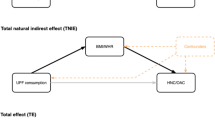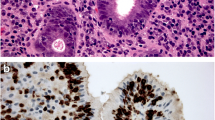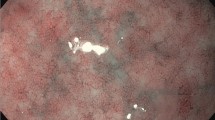Abstract
Previous studies evaluating whether risk factors for gastric cancer are also associated with colorectal cancer (CRC) have shown inconsistent results. We prospectively examined the association of atrophic gastritis, a pre-malignant condition for gastric cancer and long-term sequelae common to many exposure factors, and the risk of incident CRC.
Methods
A total of 20,928 Finnish male smokers, aged 50–69, who were participants in the Alpha-Tocopherol, Beta-Carotene Cancer Prevention Study (ATBC) had serum pepsinogen I (SPGI) levels measured. Participants with low SPGI levels (<25 μg/l; n = 1,665) were invited for gastroscopy. Of these, 1,059 (63.6%) participants underwent gastroscopy and atrophic gastritis was histologically confirmed in 1,006 (95.0%) participants. We used Cox proportional hazards regression to evaluate the risk of incident CRC.
Results
During a mean follow-up of 11.3 years (236,258 person-years), 425 incident CRCs were diagnosed. The incidence rates were 1.82, 1.48, and 1.82 per 1,000 person-years of follow-up for participants with normal SPGI (≥25 μg/l), low SPGI, and histologically confirmed atrophic gastritis, respectively. Compared to subjects with normal SPGI, there was no increased risk of CRC among subjects with low SPGI (Adjusted Hazard Ratio (HR) = 0.71; 95% CI: 0.47–1.05) and among those with histologically confirmed atrophic gastritis (Adjusted HR = 0.86; 95% CI: 0.55–1.34).
Conclusion
Atrophic gastritis is not associated with an increased risk of colorectal cancer among male smokers.

Similar content being viewed by others
Abbreviations
- ATBC:
-
Alpha-tocopherol, beta-carotene cancer prevention study
- CI:
-
Confidence interval
- CRC:
-
Colorectal cancer
- HR:
-
Hazard ratio
- SPGI:
-
Serum pepsinogen I
References
Newbold KM (1989) Undifferentiated cells in gastrointestinal mucosa inferring an association between carcinoma of the colon and intestinal type gastric cancer. J Clin Pathol 42(5):523–524
Jones M, Helliwell P, Pritchard C, Tharakan J, Mathew J (2007) Helicobacter pylori in colorectal neoplasms: is there an aetiological relationship? World J Surg Oncol 12(5):51
Zumkeller N, Brenner H, Chang-Claude J, Hoffmeister M, Nieters A, Rothenbacher D (2007) Helicobacter pylori infection, interleukin-1 gene polymorphisms and the risk of colorectal cancer: evidence from a case–control study in Germany. Eur J Cancer 43(8):1283–1289
Machida-Montani A, Sasazuki S, Inoue M et al (2007) Atrophic gastritis, Helicobacter pylori, and colorectal cancer risk: a case–control study. Helicobacter 12(4):328–332
Limburg PJ, Stolzenberg-Solomon RZ, Colbert LH et al (2002) Helicobacter pylori seropositivity and colorectal cancer risk: a prospective study of male smokers. Cancer Epidemiol Biomarkers Prev 11(10 Pt 1):1095–1099
Kuipers EJ (2006) Proton pump inhibitors and gastric neoplasia. Gut 55(9):1217–1221
Hollande F, Imdahl A, Mantamadiotis T, Ciccotosto GD, Shulkes A, Baldwin GS (1997) Glycine-extended gastrin acts as an autocrine growth factor in a non-transformed colon cell line. Gastroenterology 113:1576–1588
Ciccotosto GD, McLeish A, Hardy KJ, Shulkes A (1995) Expression, processing, and secretion of gastrin in patients with colorectal carcinoma. Gastroenterology 109(4):1142–1153
van Soest EM, van Rossum LG, Dieleman JP et al (2008) Proton pump inhibitors and the risk of colorectal cancer. Am J Gastroenterol 103(4):966–973
Robertson DJ, Larsson H, Friis S, Pedersen L, Baron JA, Sørensen HT (2007) Proton pump inhibitor use and risk of colorectal cancer: a population-based, case–control study. Gastroenterology 133(3):755–760
Yang YX, Hennessy S, Propert K, Hwang WT, Sedarat A, Lewis JD (2007) Chronic proton pump inhibitor therapy and the risk of colorectal cancer. Gastroenterology 133(3):748–754
Siersema PD, Yu S, Sahbaie P et al (2006) Colorectal neoplasia in veterans is associated with Barrett’s esophagus but not with proton-pump inhibitor or aspirin/NSAID use. Gastrointest Endosc 63(4):581–586
Seitz JF, Giovannini M, Gouvernet J, Gauthier AP (1991) Elevated serum gastrin levels in patients with colorectal neoplasia. J Clin Gastroenterol 13:541–545
Smith JP, Wood JG, Solomon TE (1989) Elevated gastrin levels in patients with colon cancer or adenomatous polyps. Dig Dis Sci 34:171–174
Wong K, Beardshall K, Waters CM, Calam J, Poston GJ (1991) Postprandial hypergastrinaemia in patients with colorectal cancer. Gut 32:1352–1354
Thorburn CM, Friedman GD, Dickinson CJ, Vogelman JH, Orentreich N, Parsonnet J (1998) Gastrin and colorectal cancer: a prospective study. Gastroenterology 115:275–280
Kikendall JW, Glass AR, Sobin LH, Bowen PE (1992) Serum gastrin is not higher in subjects with colonic neoplasia. Am J Gastroenterol 87:1394–1397
Penman ID, el-Omar E, Ardill JE et al (1994) Plasma gastrin concentrations are normal in patients with colorectal neoplasia and unaltered following tumor resection. Gastroenterology 106:1263–1270
Yapp R, Modlin IM, Kumar RR, Binder HJ, Dubrow R (1992) Gastrin and colorectal cancer. Evidence against an association. Dig Dis Sci 37:481–484
Varis K, Kekki M, Harkonen M, Sipponen P, Samloff IM (1991) Serum pepsinogen I and serum gastrin in screening of atrophic pangastritis with high risk of gastric cancer. Scand J Gastroenterol Suppl 186:117–123
Yanaoka K, Oka M, Mukoubayashi C et al (2008) Cancer high-risk subjects identified by serum pepsinogen tests: outcomes after 10-year follow-up in asymptomatic middle-aged males. Cancer Epidemiol Biomarkers Prev 17(4):838–845
Miki K (2006) Gastric cancer screening using the serum pepsinogen test method. Gastric Cancer 9(4):245–253
Cancer Prevention Study Group ATBC (1994) The Alpha-Tocopherol, Beta-Carotene Lung Cancer Prevention Study. Ann Epidemiol 4:1–10
Alpha-Tocopherol, Beta-Carotene Cancer Prevention Study Group (1994) The effect of vitamin E and beta-carotene on the incidence of lung cancer and other cancers in male smokers. N Engl J Med 330:1029–1035
Samloff IM (1982) Pepsinogens I and II: purification from gastric mucosa and radioimmunoassay in serum. Gastroenterology 82(1):26–33
Varis K, Taylor PR, Sipponen P et al (1998) The Helsinki gastritis study group. Gastric cancer and premalignant lesions in atrophic gastritis: a controlled trial on the effect of supplementation with alpha-tocopherol and betacarotene. Scand J Gastroenterol 33:294–300
Varis K, Sipponen P, Laxe′n F et al (2000) The Helsinki gastritis study group. Implications of serum pepsinogen I in early endoscopic diagnosis of gastric cancer and dysplasia. Scand J Gastroenterol 35:950–956
Price AB (1991) The Sydney system: histological division. J Gastroenterol Heptol 6:209–222
Korhonen P, Malila N, Pukkala E, Teppo L, Albanes D, Virtamo J (2002) The Finnish cancer registry as follow-up source of a large trial cohort: accuracy and delay. Acta Oncol 41:381–388
Robertson DJ, Sandler RS, Ahnen DJ et al (2009) Gastrin, Helicobacter pylori, and Colorectal Adenomas. Clin Gastroenterol Hepatol 7(2):163–167
Ferlay J, Bray F, Pisani P, Parkin DM (2004). GLOBOCAN 2002: Cancer incidence, mortality and prevalence worldwide IARC CancerBase no. 5. version 2.0, IARC Press, Lyon. http://www-dep.iarc.fr/. Accessed 6 Jan 2009
Lee JK, Park BJ, Yoo KY, Ahn YO (1995) Dietary factors and stomach cancer: a case–control study in Korea. Int J Epidemiol 24(1):33–41
Buiatti E, Palli D, Decarli A et al (1989) A case–control study of gastric cancer and diet in Italy. Int J Cancer 44(4):611–616
Ramón JM, Serra L, Cerdó C, Oromí J (1993) Dietary factors and gastric cancer risk. A case–control study in Spain. Cancer 71(5):1731–1735
Acknowledgments
This research was supported by the Intramural Research Program of the National Institutes of Health, Division of Cancer Epidemiology and Genetics, National Cancer Institute, and the Division of Cancer Prevention, National Institutes of Health, Department of Health and Human Services. The funding agency had a role in the design and reporting of the study and in the decision to submit the manuscript for publication and approved the final version of the manuscript.
Author information
Authors and Affiliations
Corresponding author
Rights and permissions
About this article
Cite this article
Laiyemo, A.O., Kamangar, F., Marcus, P.M. et al. Atrophic gastritis and the risk of incident colorectal cancer. Cancer Causes Control 21, 163–170 (2010). https://doi.org/10.1007/s10552-009-9446-4
Received:
Accepted:
Published:
Issue Date:
DOI: https://doi.org/10.1007/s10552-009-9446-4




